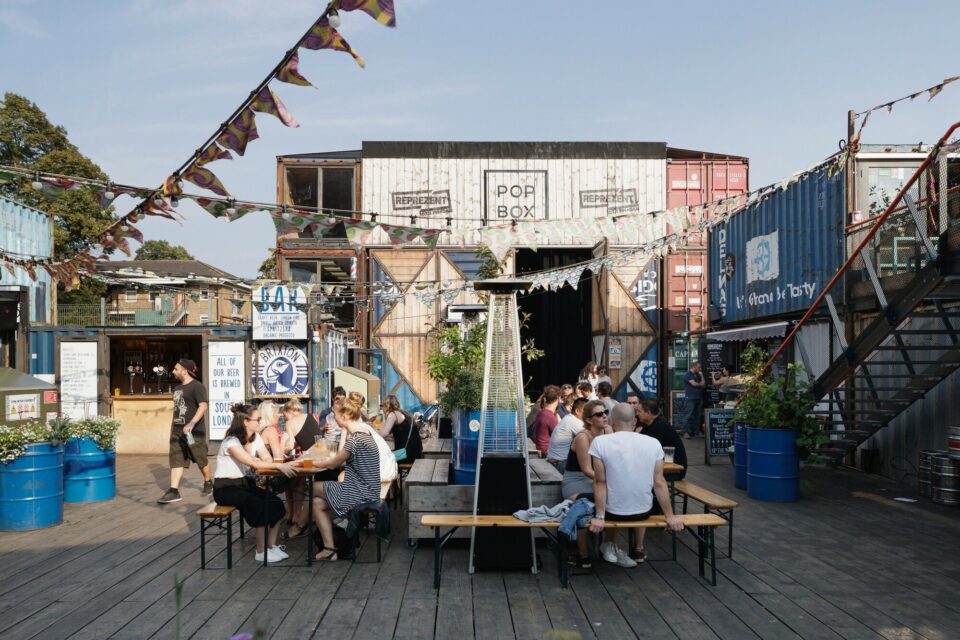Ckham Levels have also been proactive in sharing their knowledge and experience with others. They have provided valuable insights and practical tips for creating successful public spaces, contributing to the growing body of knowledge on how to revitalize urban areas through innovative and sustainable development.
Unlocking the Potential of Public Spaces: What We Can Learn from Pop Brixton and Peckham Levels in London
Learn how Pop Brixton and Peckham Levels have unlocked the potential of public spaces in London, and how their success can provide valuable insights for other urban development projects.
The Rise of Pop Brixton and Peckham Levels
In recent years, there has been a growing trend towards the repurposing and revitalization of public spaces in urban areas. Nowhere is this more evident than in London, where initiatives like Pop Brixton and Peckham Levels have transformed underutilized spaces into vibrant hubs of creativity, community, and commerce. These projects serve as shining examples of what can be achieved when public spaces are reimagined and repurposed to better serve the needs of local residents and businesses.
Pop Brixton: A Model of Sustainable Urban Development
Pop Brixton is a pioneering project that has successfully transformed a disused plot of land into a thriving community of independent businesses, cultural organizations, and local entrepreneurs. This dynamic hub is built entirely from shipping containers, providing an affordable and sustainable solution for creating flexible retail spaces and affordable workspaces.
Pop Brixton has become a magnet for creativity and innovation, offering a diverse range of amenities, including restaurants, bars, retail outlets, event spaces, and even co-working spaces. The project has also been instrumental in fostering a sense of community and collaboration, with regular events, workshops, and markets that bring people together from all walks of life.
Key Features of Pop Brixton:
- Repurposed shipping containers for retail and workspace
- Diverse range of amenities, including restaurants, bars, and event spaces
- Community-focused events and workshops
- Support for local entrepreneurs and cultural organizations
Peckham Levels: A Vertical Community Space
Located in the heart of Peckham, Peckham Levels has been heralded as a groundbreaking project that has transformed a disused multi-story car park into a vibrant cultural destination. This innovative space is home to a mix of independent businesses, artist studios, co-working spaces, and event venues.
One of the standout features of Peckham Levels is its vertical layout, which allows for a diverse range of activities and experiences to coexist within a single building. The project has been instrumental in providing a platform for emerging artists and creative entrepreneurs to showcase their work and connect with a wider audience.
Key Features of Peckham Levels:
- Repurposed multi-story car park into a cultural destination
- Vertical layout supporting diverse activities and experiences
- Platform for emerging artists and creative entrepreneurs
- Community-focused events and workshops
Unlocking the Potential of Public Spaces
The success of Pop Brixton and Peckham Levels serves as a powerful reminder of the untapped potential that lies within underutilized public spaces. By reimagining these spaces as hubs of creativity, community, and commerce, it is possible to breathe new life into urban areas and create opportunities for local residents and businesses.
These projects also offer valuable insights for urban planners, developers, and policymakers looking to unlock the potential of public spaces in their own communities. By embracing the principles of sustainability, inclusivity, and creativity, it is possible to create public spaces that are not only aesthetically pleasing but also economically and socially impactful.
Benefits and Practical Tips for Unlocking Public Space Potential:
- Embrace sustainable and affordable design solutions
- Foster a sense of community and collaboration
- Provide diverse amenities and activities to cater to different demographics
- Create platforms for local entrepreneurs and artists to thrive
Case Studies: Replicating Success
The success of Pop Brixton and Peckham Levels has not gone unnoticed, and there is growing interest in replicating their achievements in other urban areas. These projects have demonstrated that it is possible to transform underutilized spaces into dynamic hubs of activity and creativity, providing valuable lessons for urban development initiatives around the world.
One such example is the Boxpark concept, which has successfully brought the pop-up mall concept to several locations across the UK, including Shoreditch and Croydon. By repurposing shipping containers into retail and dining spaces, Boxpark has created vibrant destinations that attract locals and tourists alike, while providing a platform for small businesses and startups.
Firsthand Experience: Learning from the Innovators
The teams behind Pop Brixton and Pe
Using empty shops, disused buildings, or undeveloped sites until they are given a purpose is what is known as a “meanwhile space”. This idea centers on making productive use of these spaces during the interim period before a long-term purpose is established. Essentially, it’s about what happens in the meantime, turning unused spaces into vibrant, functional places during periods of uncertainty or transition.
In London, United Kingdom, meanwhile spaces have gained recognition as an effective tool for urban regeneration. They provide an opportunity to test new ideas, engage with local communities, revitalize urban space and navigate regulatory and ownership challenges more easily. Projects like Pop Brixton and Peckham Levels are notable examples of how meanwhile spaces can transform underutilized areas into vibrant hubs of activity and contribute positively to the urban landscape during periods of transition.
One significant advantage of meanwhile projects is the increased footfall they bring to an area that can revitalize otherwise dormant neighborhoods. These spaces provide vital opportunities for start-ups and growth for existing businesses by offering affordable and flexible environments which foster innovation and entrepreneurship. The local economy also gains through the creation of employment opportunities by attracting visitors as unique vibrant spots arise.
Moreover, meanwhile spaces contribute to the social fabric by promoting a sense of togetherness and belonging in communities. These previously underutilized areas turn into lively hubs where people can connect on various levels whether through collaborations or simply sharing experiences.
The concept behind these interim living systems began around 8-9 years ago when there was a need seen to activate vacant urban land creatively for local communities’ betterment. As cities continue growing at unprecedented rates especially considering that 68% (United Nations) live in cities by 2050 huge actions will need implementing today on these vacant lands found within different cities globally!In an environment like London, where rapid development and the need for vibrant public spaces are consistently at odds, temporary projects offer local councils a valuable tool to capitalize on underutilized assets. These spaces are generally established with the understanding that they will only exist for a few years, serving as interim solutions until the land is ready for its final purpose. This approach has gained popularity in inner-city areas of London, where land owned by local government is exceedingly scarce.
Under this ownership model, local governments retain possession of underutilized land or buildings while private organizations oversee their operation and management. This model operates on a profit-share basis, where revenue generated from the temporary use of the space is divided between the private operator and the public entity. Not relying on ownership transfer offers flexibility and sustainability to maximize urban spaces during periods of transition without significant upfront costs being incurred by local governments.
The success of meanwhile space initiatives was first seen in Pop Brixton launched in 2015 in Brixton’s heart, followed by Peckham Levels which opened its doors in December 2017. Both projects have revitalized neglected urban areas by transforming them into vibrant community hubs offering affordable co-working spaces to creatives and small businesses. The power of these temporary projects can be seen not only through environmental revitalization but also community building efforts within neglected urban areas.
Pop Brixton has played an active role in creating jobs within various business segments across its site while Peckham Levels provides diverse amenities including food kiosks, bars, yoga studios as well as children’s play area aimed at making these places enjoyable destinations for people from all walks of life. Most importantly platforms such as Pop Brixton create opportunities for local startups to test ideas and eventually establish more permanent operations thereby creating dynamic ecosystems filled with innovation and growth within communities that have traditionally been overlooked or ignored.
The successes demonstrated at both sites illustrate how otherwise forgotten urban spots can benefit from a renewed sense of vitality brought about through these temporary structures which significantly improve existing infrastructure temporarily without requiring extensive financial commitments from local governments until they become available or ready for redevelopment later down the line.The Transformative Potential of Meanwhile Spaces in Urban Development
The success of Peckham Levels and Pop Brixton has demonstrated the potential of meanwhile spaces as a sustainable model for urban development. These projects make use of underutilized land owned by local governments to test the demand for workspace and community facilities. The resulting profit-share models provide revenue streams for local authorities, ensuring that these spaces remain affordable and accessible while also allowing councils to retain ownership of the sites. As cities continue to evolve, these projects emphasize the importance of flexible, temporary solutions in addressing the changing needs of urban communities.
Challenges Faced by Meanwhile Spaces
Despite their transformative potential, meanwhile spaces like Pop Brixton and Peckham Levels face significant challenges that must be addressed. One primary challenge is securing sustainable funding and managing operational costs. Financial viability often relies on striking a balance between revenue generation and affordability. Additionally, the short-term nature of these projects can create uncertainties for operators and tenants who desire long-term security.
There is also a risk of gentrification associated with meanwhile spaces’ ability to revitalize neglected areas. As these projects attract more visitors and investment, they may drive up living costs, potentially displacing the very communities they aimed to support. Mitigating this risk requires ensuring that benefits are equitably distributed among local residents.
Maximizing Benefits Through Thoughtful Planning
While there are challenges faced by meanwhile spaces such as securing funding, managing operational costs, gentrification risks, adaptability concerns etc., their impact on urban regeneration presents new possibilities for cities worldwide! Projects like Pop Brixton and Peckham Levels have rejuvenated neglected areas while supporting creativity,supporting local businesses & strengthening community bonds! This demonstrates that with thoughtful planning & management;meanwhile spaces can offer valuable benefits extending beyond their temporary presence.
This article falls under ArchDaily Topics: Multi-Purpose Spaces category which delves into exploring topics in-depth through articles,interviews & architecture projects.
What do you think? Do you want to share your opinion or collaborate with us? Contact us anytime!


